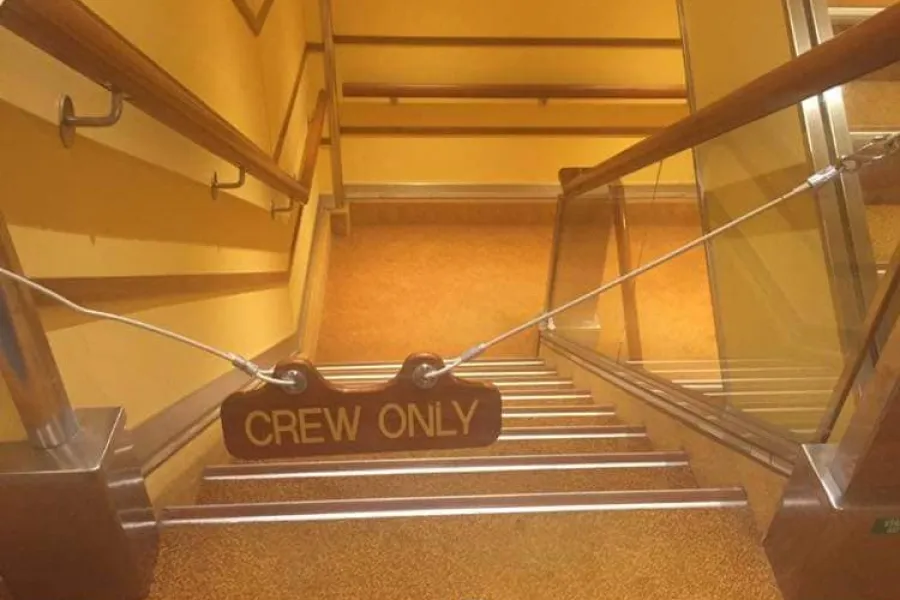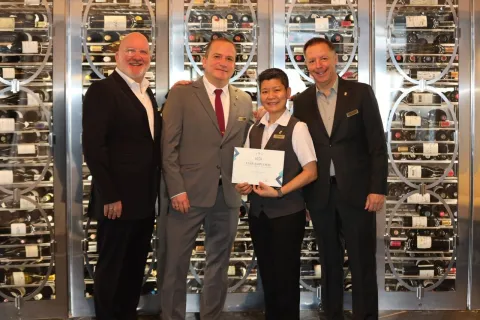
The following article is a guest post from Mladen Jakovljevic - former crew member and author of the book "Modern Age Slavery"
My memories brought me years behind in the past. It was 2010. At that time, I was working on a cruise ship sailing out from San Juan, Puerto Rico. It was my third contract with the Company. Most of our guests onboard were from Puerto Rico, and only some were from Great Britain. As part of the bar department operation plan onboard the cruise ship, we did not have a fixed salary, only a commission from the drinks sold. What was remarkable from that contract was that after 7 months of working on the ship, I arrived in my home country with $50 in my pocket. Yes, correct, At that time, back in 2010, I spent 210 days at the sea while working seven days a week, yet my total savings were only $50.
You wonder how?
Let us say, for example, that you are a guest onboard the ship and have decided to purchase one beer. It will cost you $7,50; on top of that, it will be added $1.13, a 15 percent service fee-gratuity charge. In 2010, most British guests on board, despite being pretty wealthy, preferred to avoid paying gratuity for their servers onboard the ship.
In other words, during one working day, my sales were usually around $500. With a simple calculation, my earned gratuity for that day should be $33. Here is why I am saying," it should be." While onboard the cruise ship in San Juan, our Puertorican and British guests enjoyed the best possible customer service. Polite bar waiters and professional bartenders provided efficient, personalized, outstanding customer service at all times. So why did we work for free at that time? Let's put it this way. Our British and Puertorican guests enjoyed the best times of their lives while being our respectful guests onboard and at the same time, but they wanted to pull out their paid gratuities on the very last evening of their cruise. That way, around 120 bar waiters and bartenders on board ended up working for free seven days a week! Pretty shocking facts, you would agree? No wonder the company ships registered in Panama-company did not have to obey US labor rules and regulations. The sarcastic part of that contract in 2010 at that time, bar staff on board the ship was forced to buy their flight ticket to reach their home country upon the end of the contract. At that time, a one-way ticket from San Juan to Belgrade cost $1800. So if you consider that with the guest pulling out gratuity, I was making, on average, $300 monthly, it's easy to convert that it took me six months of hard work on the ship to save money to pay my ticket home. The Company did not care. Dollars kept coming; that's all it mattered to them. All bar staff signed the petition against cruel labor rules on board the ship at that time.

We demanded to pay for our flight ticket at the end of our contract. The paper was signed by all 120 workers in the bar department and forwarded to the Miami office. A few days later, a response message came back from the highest company official:" Company reviewed your request for assisting with the flight tickets to your home country. However, this is not possible due to company budget limitations."
Hotel Director, who was also from England, did not seem concerned. At the bar department meeting that was held shortly after our signed petition, he said," Guys, If you don't like our rules here, you are free to resign any time; just let me know. "
How discouraging was hearing such a statement from someone supposed to be a motivating leader for all of us on board the ship during those difficult times? Truly unbelievable. Guests onboard that ship were given the option to remove gratuity without even explaining the reason why. Those guests would probably feel ashamed of themselves if they only knew what damage they had cost the crew members' families. We worked seven days a week for 210 days straight just for food and a place to sleep. Yet, we still smiled every day onboard, and despite all this, we still managed to provide world-class customer service to our guests at all times. On that contract back in 2010, It took me 180 days at work to buy my ticket home.
Welcome to the seaman's world. The Company was distancing itself from crew members' underpayment issues on board. They even blamed a third party, the agency selling those cruises at that time. The British and Puertorican guests simply took advantage of that rotten company system. Those guests still paid for their drinks; only our gratuities were pulled out and sacrificed. That gratuity was the only thing we counted on with no fixed salary. Our Hard-earned money was taken away from crew members in the wrong way. Indeed, guests were always happily drunk, and the Company was happily sober while counting their enormous revenues.
How about hard-working crew members, the most significant company assets indeed? Were we Working like a donkey and getting paid peanuts? When I look back at those times, It's crystal clear why and how such a huge cruise ship corporation grew enormously throughout the years. The simple formula of their success was everything but not sustainable. Use the blood and sweat of the crew members to build giant new ships every year. While working for seven months onboard the cruise ship in San Juan, my family also needed support. But who cares? More importantly, why would someone care at all? Working on a cruise ship is everything but not fair. That contract remained like a pure reflection of human greed at its worst, a company that achieved all financial targets at the expense of its crew, the Company that failed in the human aspect.
Crew Insights
Articles and experiences shared by crew members working on cruise ship. Find out more about ship life at sea together with tips and advices for first time crew members and cruise oldtimers.












